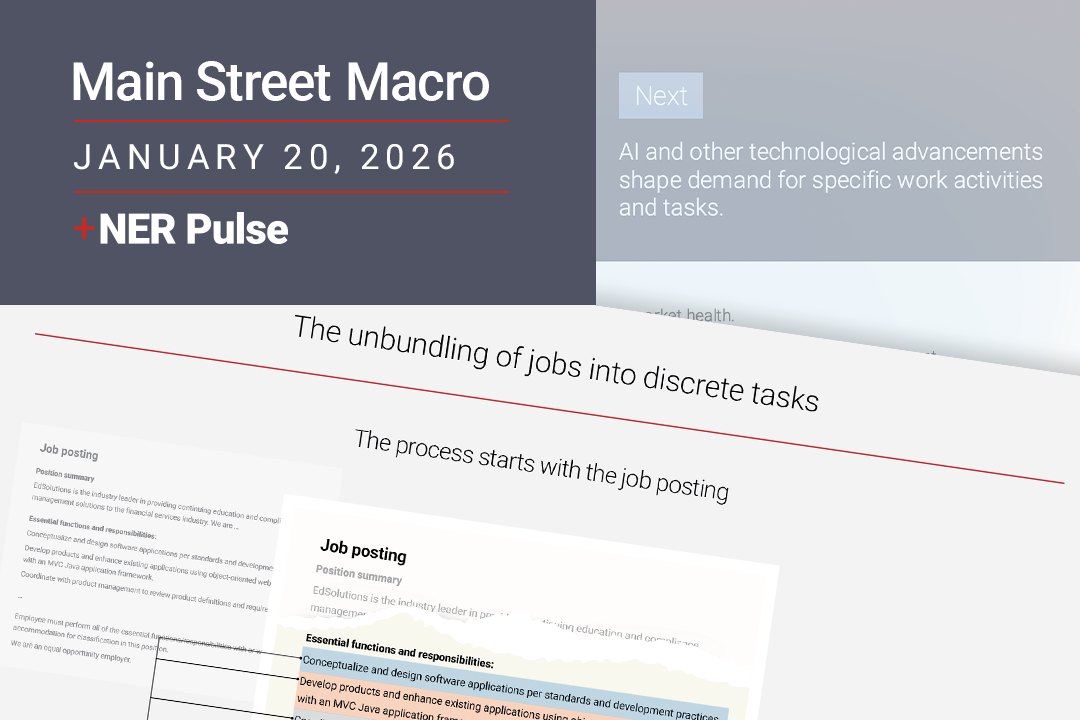FEATURED POST

January 20, 2026
AI and the great job unbundling
Greetings from the annual World Economic Forum. I’m in Davos, Switzerland, where business leaders and policymakers are sharing ideas about improving global cooperation and prosperity.
Read more

Subscribe to Data Lab
Stay up-to-date on the latest reports and trends.
Stay up to date with Data Lab
Please complete all fields.
Filter by:
August 19, 2025
In a transition, small changes add up
This week, the Federal Reserve holds its annual conference in Jackson Hole, Wyoming, where some 120 central bankers, finance leaders, and academics gather to discuss important global issues. Federal Reserve Chairman Jerome Powell caps the meeting with a much-anticipated speech on Friday. For Main Street, there’s more to this gathering than Powell’s 20-minutes address that, by design, isn’t likely to articulate what’s next for interest rates. That’s a topic for another day.
Read more
August 12, 2025
New hires, old pay
In recent months, pay has grown at a relatively steady pace for both job-stayers and job-changers for the past several months. But this data tracks only two subsets of the working population. If we zoom out to get a bigger picture, we see that pay for new hires—that big group of people who are brand new to a particular employer—has been stagnant for more than a year. When it comes to pay, new hires are in a rut.
Read more
July 22, 2025
The pandemic changed the U.S. labor market. Here’s how.
It’s been five years since Covid-19 lockdowns brought parts of the U.S. economy to a halt. While the crisis has passed, its impact on the labor market, especially wages, is still unfolding.
Read more
July 15, 2025
Gaming the odds of a pay raise in 2025? Flip a coin.
It’s a simple, but common, question for anyone with a job. Will I get a raise this year? Last week, we talked about the pandemic’s long-lasting effect on pay growth. Today, I’ll compare the current state of the labor market to where it was during the first half of 2019, the year before the pandemic began and the last year of the U.S. economy’s 10-year expansion.
Read more
July 8, 2025
The pandemic changed the U.S. labor market. Here’s how.
It’s been five years since Covid-19 lockdowns brought parts of the U.S. economy to a halt. While the crisis has passed, its impact on the labor market, especially wages, is still unfolding. In February 2020, the U.S. economy was enjoying a Goldilocks moment. Unemployment was 3.5 percent, hiring was steady, and wages were rising modestly faster than inflation.
Read more
June 24, 2025
From good to gloom. Main Street is bracing for a slowdown.
By almost every metric that matters, the U.S. economy has delivered in the first six months of 2025. Unemployment stayed low, consumers kept spending, and inflation retreated. Despite this encouraging performance, the economic outlook has dimmed. When Federal Reserve policymakers met last week to decide whether to cut interest rates, their individual forecasts combined painted a cautious picture.
Read more
June 17, 2025
Where have all the workers gone?
Every now and then, it’s worth taking a break from rapidly changing economic developments to focus on long-term trends affecting the world of work. One long, slow change we’ve been living through for years is the evolution of labor market participation in the United States.
The unemployment rate grabs most of the attention every month as an indicator of the health of the labor market because it tells us how easy, or difficult, it is for people to find jobs.
Read more
June 10, 2025
The big deal about small employers
Last week, ADP data showed that employers with fewer than 50 workers shed a large number of jobs—13,000—in May. While one month doesn’t make a trend, it does remind us of the big role small employers play in our economy. So, when it comes to the macroeconomy, what’s the big deal with small employers? Here are three reasons small businesses have an outsized impact on the U.S. labor market.
Read more
